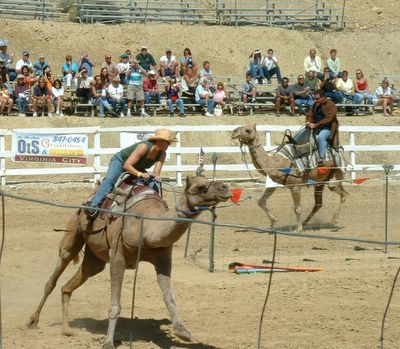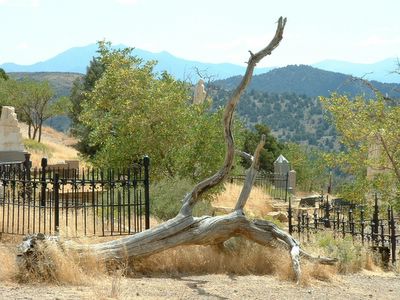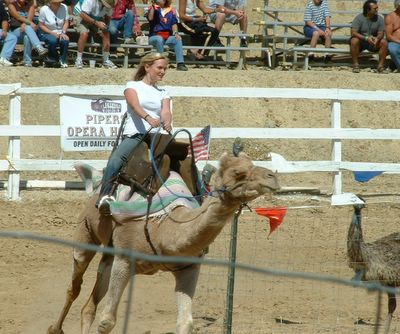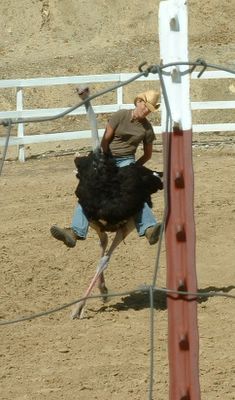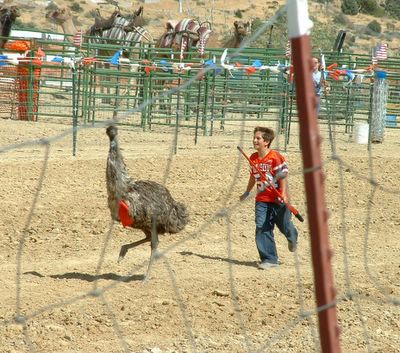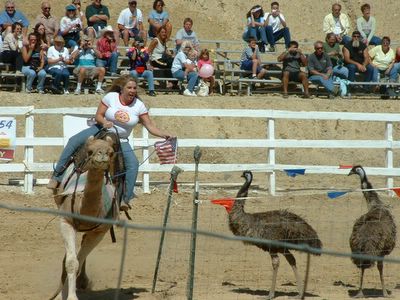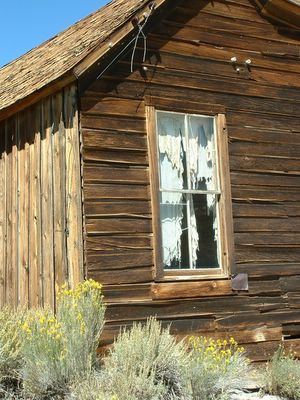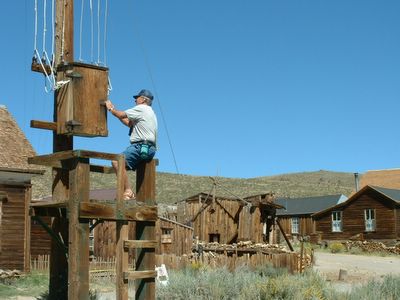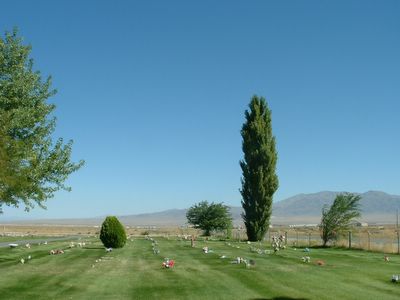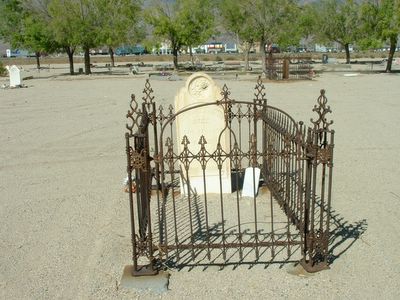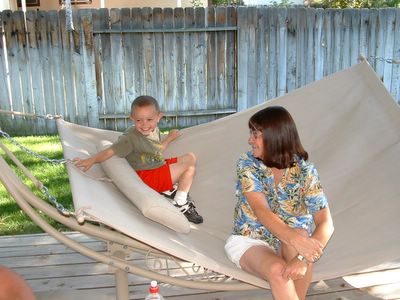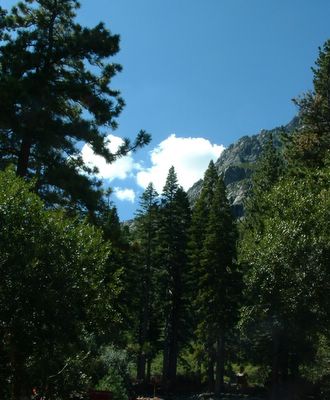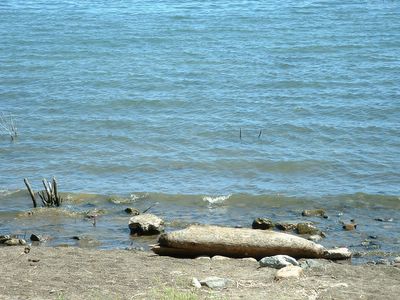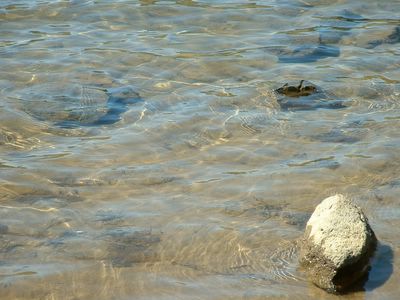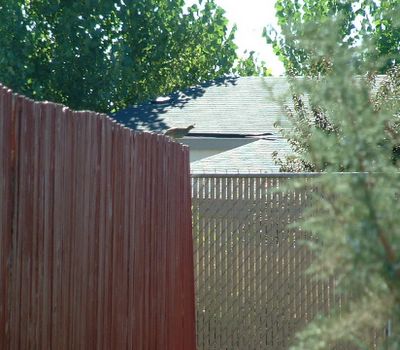
Monday, September 12
Sunday, September 11
Color Landform Atlas of the United States
Color Landform Atlas of the United States See the USA like you've never seen it before!
Map lovers will love this site — The Color Landform Atlas of the United States. Click onto the state you wish to view and then see it through various maps including satellite views. This is so cool!
Map lovers will love this site — The Color Landform Atlas of the United States. Click onto the state you wish to view and then see it through various maps including satellite views. This is so cool!
Friday, September 9
Thursday, September 8
Photos/Pictures of Bodie, California
Son Gary found this info on Bodie CA...A great site for more insight!
Dan Heller's Photos/Pictures of Bodie, California
Dan Heller's Photos/Pictures of Bodie, California
Omelets in a Bag!
Have your guests use a permanent marker to write their name on a quart size freezer bag. Crack two large or extra-large eggs into the bag (more than two will not work), shake and knead the bag to break the yoke and combine the eggs. Provide a variety of ingredients such as cheese, ham, onion, green pepper, mushrooms, tomato, hash browns, salsa, etc? Have the guests add the prepared ingredients of their choice to the bag and shake. Make sure to get the air out of the bag and zip it up. Place the bags into rolling-boiling water for exactly 13 minutes. You can usually cook 6-8 omelets in a large pot. Use another pot of boiling water if you have more than 8 omelets to make. After 13 minutes, have the guest take their bag, open it and the omelet will roll out easily onto their plate. Be prepared for everyone to be thrilled. A serving suggestion would be with fresh fruit and a coffee cake, muffins, caramel rolls, jelly rolls, etc? The omelets are a great conversation piece and everyone gets involved in the process. It's easy, convenient, delicious and low-fat!! Have FUN!!
Tuesday, September 6
Monday, September 5
These 3 things
Sometimes symptoms of a stroke are difficult to
identify. Unfortunately, the lack of awareness spells
disaster. The stroke victim may suffer brain damage
when people nearby fail to recognize the symptoms of a
stroke. Now doctors say a bystander can recognize a
stroke by asking three simple questions:
*Ask the individual to SMILE.
*Ask him or her to RAISE BOTH ARMS.
*Ask the person to SPEAK A SIMPLE SENTENCE.
If he or she has trouble with any of these tasks, call
9-1-1 immediately and describe the symptoms to the
dispatcher.
After discovering that a group of nonmedical
volunteers could identify facial weakness, arm
weakness and speech problems, researchers urged the
general public to learn the three questions. They
presented their conclusions at the American Stroke
Association's annual meeting last February. Widespread
use of this test could result in prompt diagnosis and
treatment of the stroke and prevent brain damage.
A cardiologist says if everyone who reads this
remembers it, you can bet that at least one
life will be saved.
identify. Unfortunately, the lack of awareness spells
disaster. The stroke victim may suffer brain damage
when people nearby fail to recognize the symptoms of a
stroke. Now doctors say a bystander can recognize a
stroke by asking three simple questions:
*Ask the individual to SMILE.
*Ask him or her to RAISE BOTH ARMS.
*Ask the person to SPEAK A SIMPLE SENTENCE.
If he or she has trouble with any of these tasks, call
9-1-1 immediately and describe the symptoms to the
dispatcher.
After discovering that a group of nonmedical
volunteers could identify facial weakness, arm
weakness and speech problems, researchers urged the
general public to learn the three questions. They
presented their conclusions at the American Stroke
Association's annual meeting last February. Widespread
use of this test could result in prompt diagnosis and
treatment of the stroke and prevent brain damage.
A cardiologist says if everyone who reads this
remembers it, you can bet that at least one
life will be saved.
Labor Arts
Link of the Day:
LaborArts
Happy Labor Day! Did you know that Labor Day evolved from an 1882
celebration and parade in honor of the working class by the Knights of
Labor in New York and was declared a national holiday in 1894? What
better way to celebrate this historic day than to take a tour through
unseen America in which workers raise their cameras to give us an
intimate look at their lives. As the introduction states, "Labor Arts
is a virtual museum; we gather, identify and display images of the
cultural artifacts of working people and their organizations. Our
mission is to present powerful images that help us understand the past
and present lives of working people." Take a few minutes to check out
the entire site while you leisurely enjoy Labor Day!
Labor Arts
LaborArts
Happy Labor Day! Did you know that Labor Day evolved from an 1882
celebration and parade in honor of the working class by the Knights of
Labor in New York and was declared a national holiday in 1894? What
better way to celebrate this historic day than to take a tour through
unseen America in which workers raise their cameras to give us an
intimate look at their lives. As the introduction states, "Labor Arts
is a virtual museum; we gather, identify and display images of the
cultural artifacts of working people and their organizations. Our
mission is to present powerful images that help us understand the past
and present lives of working people." Take a few minutes to check out
the entire site while you leisurely enjoy Labor Day!
Labor Arts
Sunday, September 4
Saturday, September 3
AT THE MIDDLE PASSAGE
By Walter Mills
What We Talk About When We Talk About War
Earlier in the summer we visited friends on the other side of the
mountain. While the children wandered off to play games upstairs, we
sat around their kitchen table in the late afternoon and talked for some
time about the state of the world.
Most of the talk was political, about the policies of the current
administration, but as I sat quietly, for the most part, and listened,
it felt like some larger sense of dismay was being talked about below
the surface. I have been hearing its echoes ever since.
Except on a local and personal level, I don't think that anyone is happy
with the way things are going in the first decade of the new millennium.
With the collapse of the Soviet Union and the threat of nuclear war
fading, we had hope in the eighties and nineties that we had left
behind the worst problems of the worst century in history. We felt for a
brief, giddy moment that we had turned some kind of corner and were
stepping out of the shadows into the sunlight.
But this new century is shaping up as a mirror image of the previous
one, with a pervasive fear of terrorism taking the place of communism in
our psyche. It is almost as if the dark part of our selves had to find
its counterpart in a global evil, as if we had to have a war on
something, if not a Cold War, then the War on Terror.
Once we begin to use the terms of war, we fall back into our old bad
habits. We have no choice except to mobilize our troops, build up our
arsenals and demonize our enemy. We know how to do war much better than
we know how to make peace. We're good at war; we've had so much
practice at it these last hundred years. Our hand reaches toward a gun
or a bigger military budget automatically, the way a smoker reaches for
his pack of cigarettes.
We are now beginning to believe we are in a long and inevitable
conflict with radical Islamist fundamentalism. Pundits are telling us
that it is a conflict that will shape our future and our children's and
grandchildren's future for decades to come. We have to be prepared, in
other words, for a long and costly struggle, one that will drain the
resources we might otherwise use to educate our children or solve our
healthcare dilemma. Is there really anything inevitable about this at
all, or are we creating the evil by preparing for it?
We know by now how vulnerable we are to suggestion. Clumsy and leading
questions helped school children in California to "remember" all sorts
of abuse that never took place. Recent experiments with adults show
that we can be led to remember events that we never experienced. If a
fortune teller predicts that you will fall in love with a tall,
dark-haired stranger, don't be amazed if that is exactly who you choose
to talk to at a party.
When we talk about war, the images spring up on their own. We see tanks
and marching troops, airplanes streaking overhead. We see ships
steaming out of port, and walls and barbed wired around our borders.
What else can we do but follow those images to their logical conclusion,
even if the enemy is a couple of hundred or thousand badly armed
terrorists hiding in a country so poor and broken it can't pave its
roads?
I don't have the answers for why the world has grown dark again after
the bright promise of the Velvet Revolution and Solidarity, the end of
the Evil Empire and the fall of the Berlin Wall. Is it a shadow inside
us that we project across the future? Or have we made war our hard to
break bad habit?
It was almost evening and the shadows were growing long in the kitchen
where we still sat talking across the table. Lois quoted a line from the
philosopher Bertrand Russell. "The whole problem with the world is that
fools and fanatics are always so certain of themselves, but wiser people
so full of doubts." We asked her to write it down, and I have it here
in front of me for solace in my uncertainty.
(The above column originally appeared in the Centre Daily Times and is
copyright ? 2005 by Walter Mills. All rights reserved worldwide. To
contact Walt, address your emails to wmills@chilitech.com ).
_______________________________________
By Walter Mills
What We Talk About When We Talk About War
Earlier in the summer we visited friends on the other side of the
mountain. While the children wandered off to play games upstairs, we
sat around their kitchen table in the late afternoon and talked for some
time about the state of the world.
Most of the talk was political, about the policies of the current
administration, but as I sat quietly, for the most part, and listened,
it felt like some larger sense of dismay was being talked about below
the surface. I have been hearing its echoes ever since.
Except on a local and personal level, I don't think that anyone is happy
with the way things are going in the first decade of the new millennium.
With the collapse of the Soviet Union and the threat of nuclear war
fading, we had hope in the eighties and nineties that we had left
behind the worst problems of the worst century in history. We felt for a
brief, giddy moment that we had turned some kind of corner and were
stepping out of the shadows into the sunlight.
But this new century is shaping up as a mirror image of the previous
one, with a pervasive fear of terrorism taking the place of communism in
our psyche. It is almost as if the dark part of our selves had to find
its counterpart in a global evil, as if we had to have a war on
something, if not a Cold War, then the War on Terror.
Once we begin to use the terms of war, we fall back into our old bad
habits. We have no choice except to mobilize our troops, build up our
arsenals and demonize our enemy. We know how to do war much better than
we know how to make peace. We're good at war; we've had so much
practice at it these last hundred years. Our hand reaches toward a gun
or a bigger military budget automatically, the way a smoker reaches for
his pack of cigarettes.
We are now beginning to believe we are in a long and inevitable
conflict with radical Islamist fundamentalism. Pundits are telling us
that it is a conflict that will shape our future and our children's and
grandchildren's future for decades to come. We have to be prepared, in
other words, for a long and costly struggle, one that will drain the
resources we might otherwise use to educate our children or solve our
healthcare dilemma. Is there really anything inevitable about this at
all, or are we creating the evil by preparing for it?
We know by now how vulnerable we are to suggestion. Clumsy and leading
questions helped school children in California to "remember" all sorts
of abuse that never took place. Recent experiments with adults show
that we can be led to remember events that we never experienced. If a
fortune teller predicts that you will fall in love with a tall,
dark-haired stranger, don't be amazed if that is exactly who you choose
to talk to at a party.
When we talk about war, the images spring up on their own. We see tanks
and marching troops, airplanes streaking overhead. We see ships
steaming out of port, and walls and barbed wired around our borders.
What else can we do but follow those images to their logical conclusion,
even if the enemy is a couple of hundred or thousand badly armed
terrorists hiding in a country so poor and broken it can't pave its
roads?
I don't have the answers for why the world has grown dark again after
the bright promise of the Velvet Revolution and Solidarity, the end of
the Evil Empire and the fall of the Berlin Wall. Is it a shadow inside
us that we project across the future? Or have we made war our hard to
break bad habit?
It was almost evening and the shadows were growing long in the kitchen
where we still sat talking across the table. Lois quoted a line from the
philosopher Bertrand Russell. "The whole problem with the world is that
fools and fanatics are always so certain of themselves, but wiser people
so full of doubts." We asked her to write it down, and I have it here
in front of me for solace in my uncertainty.
(The above column originally appeared in the Centre Daily Times and is
copyright ? 2005 by Walter Mills. All rights reserved worldwide. To
contact Walt, address your emails to wmills@chilitech.com
_______________________________________
Wednesday, August 31
When we arrived at the Fernley NV park ( Desert Rose RV Park) they were working on the lines just a few feet from where we were parked. Butch had to go tell them that this is what lineman do when they retire. We learned that they do not shut off lines to work on them during the day here. Two different nights between midnight and 4 AM there were scheduled outages. And then...
Butch went to play golf and he drove the golf cart under these high power lines and the crackle he heard spooked him so bad that he completely blew the last two holes. I must admit it was very loud and you could hear it from a fair distance away.
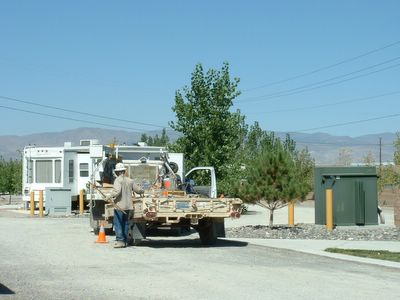
Butch went to play golf and he drove the golf cart under these high power lines and the crackle he heard spooked him so bad that he completely blew the last two holes. I must admit it was very loud and you could hear it from a fair distance away.

Monday, August 29
Last Friday we drove to Lake Tahoe and went all the way around it. It was very difficult to find a place to park. The word we saw most often was NO! NO Parking, No cars stopping on shoulder, NO RV's...No,No,No. Might as well had a sign that said NO Visitors. But we finally found a public park and parked in front of a store selling wheat grass smoothies. I couldn't talk Butch into trying one. Hehehe. Once again I did take pictures but will wait to post them till I have a connection that I do not lose every few minutes.
On Saturday old friends Donn & Peggy Gordon came to visit and we had a great time catching up on the last twenty years. We hope to see them a few more times before we are out of the area.
Yesterday Butch and I rode around a housing development on our bikes. There are over five miles of streets to ride on and it is directly behind the RV park so not a bad deal but I much prefer a nice bike trail.
We are finding out about desert living and so far we are wondering why anyone would want to do it! The campground hosts here said that had they known about the dust and wind they never would have signed on for four months. The wind has not been bad since we arrived but they are predicting forty MPH winds this afternoon. The temps have been in the nineties but with a 10% humidity you feel like you are being roasted not stewed as you are in Iowa.
On Saturday old friends Donn & Peggy Gordon came to visit and we had a great time catching up on the last twenty years. We hope to see them a few more times before we are out of the area.
Yesterday Butch and I rode around a housing development on our bikes. There are over five miles of streets to ride on and it is directly behind the RV park so not a bad deal but I much prefer a nice bike trail.
We are finding out about desert living and so far we are wondering why anyone would want to do it! The campground hosts here said that had they known about the dust and wind they never would have signed on for four months. The wind has not been bad since we arrived but they are predicting forty MPH winds this afternoon. The temps have been in the nineties but with a 10% humidity you feel like you are being roasted not stewed as you are in Iowa.
Wednesday, August 24
We have arrived in Fernley Nevada and we are signed on for a week BUT...my Internet connection is weak so I may be pushing for a change of pace after this week BUT with the holiday approaching it may make a lot more sense to sit tight for an additional week so we are a wee bit up in the air. The trip to here from Susanville was fine until we arrived at the Reno area and then it was bit of a nightmare. Lots of road construction and tight, tight areas to get through and of course the signs guiding us through it always make little or no sense. We will avoid it at all costs in the future. But the three of us are safe and sound in Fernley now.
Monday, August 22
Sunday, August 21
Common questions & answers
Why RVers are not necessarily campers and vice versa
By Chuck Woodbury, editor
I think I am finally able to define the lifestyle called RVing, which some people criticize because it's not really camping. What they do not understand is that RVing and camping are not the same, although sometimes they overlap.
Only one segment of RVers are exclusively "campers" ? those who "camp" for a week or two a year. These people generally camp in the summer, often on family vacations. They typically spend their days sightseeing or hiking and their evenings by the campfire. Their RVs, if they have one, are pretty basic and are often rented.
After Labor Day and before Memorial Day, the RVers you see on the road are more often "travelers" than "campers," using their RVs for both transportation and lodging. Their rigs are larger and better equipped than the vacation campers ? sort of "homes away from home."
Sometimes, however, these well-equipped RVers end up in the same national park or national forest campgrounds as more traditional campers and this is where their lifestyles get misinterpreted.
These avid RVers, in their bigger rigs, are simply living in a portable way. They are essentially living in self-contained, mobile condos rather than in fixed-based houses.
Many of these RVers have simplified their lives. I'm especially referring to the hundreds of thousands of retirees who have sold their homes and moved into a trailer or motorhome. At some point, they had to get rid of a lifetime of possessions. They retained what they considered important ?- fishing rods, a sewing machine, favorite books, a TV, pictures of the kids and grandkids, and nowadays, a computer.
These full-timers and serious part-timers would never be traveling America in the first place if RVs didn't exist. They would not set off in their cars month after month, staying in a different Holiday Inn each night. To do so would be too much trouble and even exhausting. They might fly off to Europe on occasion, but by and large, they would spend their lives at home.
Today, after climbing on Wyoming's Independence Rock for more than an hour and doing battle with a blustery wind, it was a wonderful feeling to return to my comfy porta-house. When I closed the door behind me, I felt truly at home, even though my street address is a thousand miles away.
I understand the concept of the portable house. It's not the same as camping.
Besides editing this website, Chuck Woodbury is the editor and publisher of RVtravel.com.
Why RVers are not necessarily campers and vice versa
By Chuck Woodbury, editor
I think I am finally able to define the lifestyle called RVing, which some people criticize because it's not really camping. What they do not understand is that RVing and camping are not the same, although sometimes they overlap.
Only one segment of RVers are exclusively "campers" ? those who "camp" for a week or two a year. These people generally camp in the summer, often on family vacations. They typically spend their days sightseeing or hiking and their evenings by the campfire. Their RVs, if they have one, are pretty basic and are often rented.
After Labor Day and before Memorial Day, the RVers you see on the road are more often "travelers" than "campers," using their RVs for both transportation and lodging. Their rigs are larger and better equipped than the vacation campers ? sort of "homes away from home."
Sometimes, however, these well-equipped RVers end up in the same national park or national forest campgrounds as more traditional campers and this is where their lifestyles get misinterpreted.
These avid RVers, in their bigger rigs, are simply living in a portable way. They are essentially living in self-contained, mobile condos rather than in fixed-based houses.
Many of these RVers have simplified their lives. I'm especially referring to the hundreds of thousands of retirees who have sold their homes and moved into a trailer or motorhome. At some point, they had to get rid of a lifetime of possessions. They retained what they considered important ?- fishing rods, a sewing machine, favorite books, a TV, pictures of the kids and grandkids, and nowadays, a computer.
These full-timers and serious part-timers would never be traveling America in the first place if RVs didn't exist. They would not set off in their cars month after month, staying in a different Holiday Inn each night. To do so would be too much trouble and even exhausting. They might fly off to Europe on occasion, but by and large, they would spend their lives at home.
Today, after climbing on Wyoming's Independence Rock for more than an hour and doing battle with a blustery wind, it was a wonderful feeling to return to my comfy porta-house. When I closed the door behind me, I felt truly at home, even though my street address is a thousand miles away.
I understand the concept of the portable house. It's not the same as camping.
Besides editing this website, Chuck Woodbury is the editor and publisher of RVtravel.com
Subscribe to:
Posts (Atom)
